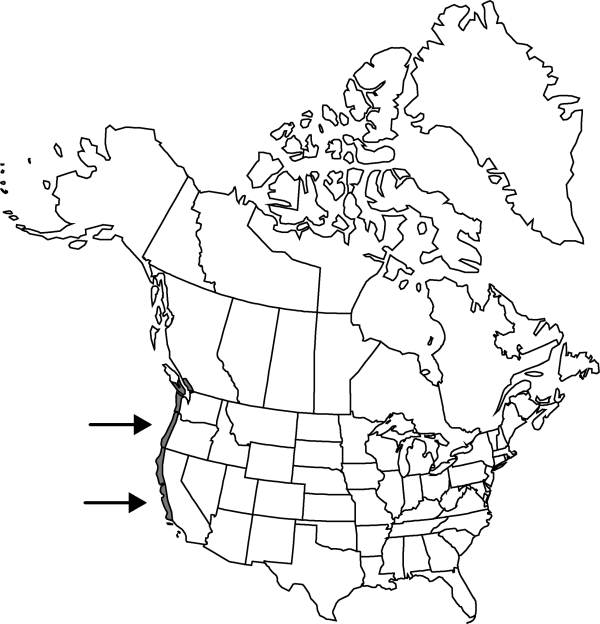Difference between revisions of "Abronia latifolia"
Mém. Acad. Imp. Sci. St. Pétersbourg Hist. Acad. 10: 281. 1826.
FNA>Volume Importer |
FNA>Volume Importer |
||
| Line 17: | Line 17: | ||
}}<!-- | }}<!-- | ||
| − | --><span class="statement" id="st- | + | --><span class="statement" id="st-undefined" data-properties=""><b>Plants </b>perennial. <b>Stems</b> prostrate, often buried in sand, usually much branched, forming large mats, succulent, densely glandular-pubescent to glabrous. <b>Leaves</b>: 1–6 cm; blade deltate-ovate to reniform, 2.2–4.8 × 2.7–5.2 cm, margins usually entire, sometimes slightly repand and undulate, surfaces glabrous or viscid-puberulent. <b>Inflorescences</b>: peduncle longer than subtending petiole; bracts ovate, 5–9 × 3–5 mm, thin, yellowish green, glandular-pubescent; flowers 17–35. <b>Perianth</b>: tube yellowish green, 6.5–18 mm, limb yellow, 8–13 mm diam., lobes slightly to moderately reflexed. <b>Fruits</b> winged, ± rhombic in profile, attenuate at both ends, 8–15 × 6–14 mm, scarious; wings 4–5, thin walled, small, cavities extending into wing.</span><!-- |
-->{{Treatment/Body | -->{{Treatment/Body | ||
| + | |phenology=Flowering spring–summer. | ||
|habitat=Sandy soils, coastal scrub, lees of dunes adjacent to strand | |habitat=Sandy soils, coastal scrub, lees of dunes adjacent to strand | ||
|elevation=0-50 m | |elevation=0-50 m | ||
| Line 39: | Line 40: | ||
|basionyms= | |basionyms= | ||
|family=Nyctaginaceae | |family=Nyctaginaceae | ||
| + | |phenology=Flowering spring–summer. | ||
|habitat=Sandy soils, coastal scrub, lees of dunes adjacent to strand | |habitat=Sandy soils, coastal scrub, lees of dunes adjacent to strand | ||
|elevation=0-50 m | |elevation=0-50 m | ||
| Line 46: | Line 48: | ||
|publication year=1826 | |publication year=1826 | ||
|special status= | |special status= | ||
| − | |source xml=https://jpend@bitbucket.org/aafc-mbb/fna- | + | |source xml=https://jpend@bitbucket.org/aafc-mbb/fna-data-curation.git/src/9216fc802291cd3df363fd52122300479582ede7/coarse_grained_fna_xml/V4/V4_139.xml |
|genus=Abronia | |genus=Abronia | ||
|species=Abronia latifolia | |species=Abronia latifolia | ||
| − | |||
| − | |||
| − | |||
| − | |||
| − | |||
| − | |||
| − | |||
| − | |||
| − | |||
| − | |||
| − | |||
| − | |||
| − | |||
| − | |||
| − | |||
| − | |||
| − | |||
| − | |||
| − | |||
| − | |||
| − | |||
| − | |||
| − | |||
| − | |||
| − | |||
| − | |||
| − | |||
| − | |||
| − | |||
| − | |||
| − | |||
| − | |||
| − | |||
| − | |||
| − | |||
}}<!-- | }}<!-- | ||
-->[[Category:Treatment]][[Category:Abronia]] | -->[[Category:Treatment]][[Category:Abronia]] | ||
Revision as of 13:57, 27 July 2019
Plants perennial. Stems prostrate, often buried in sand, usually much branched, forming large mats, succulent, densely glandular-pubescent to glabrous. Leaves: 1–6 cm; blade deltate-ovate to reniform, 2.2–4.8 × 2.7–5.2 cm, margins usually entire, sometimes slightly repand and undulate, surfaces glabrous or viscid-puberulent. Inflorescences: peduncle longer than subtending petiole; bracts ovate, 5–9 × 3–5 mm, thin, yellowish green, glandular-pubescent; flowers 17–35. Perianth: tube yellowish green, 6.5–18 mm, limb yellow, 8–13 mm diam., lobes slightly to moderately reflexed. Fruits winged, ± rhombic in profile, attenuate at both ends, 8–15 × 6–14 mm, scarious; wings 4–5, thin walled, small, cavities extending into wing.
Phenology: Flowering spring–summer.
Habitat: Sandy soils, coastal scrub, lees of dunes adjacent to strand
Elevation: 0-50 m
Distribution

B.C., Calif., Oreg., Wash.
Discussion
S. S. Tillett (1967) considered plants of Abronia umbellata var. minor (Standley) Munz to be introgressants between A. latifolia and A. umbellata.
Selected References
None.